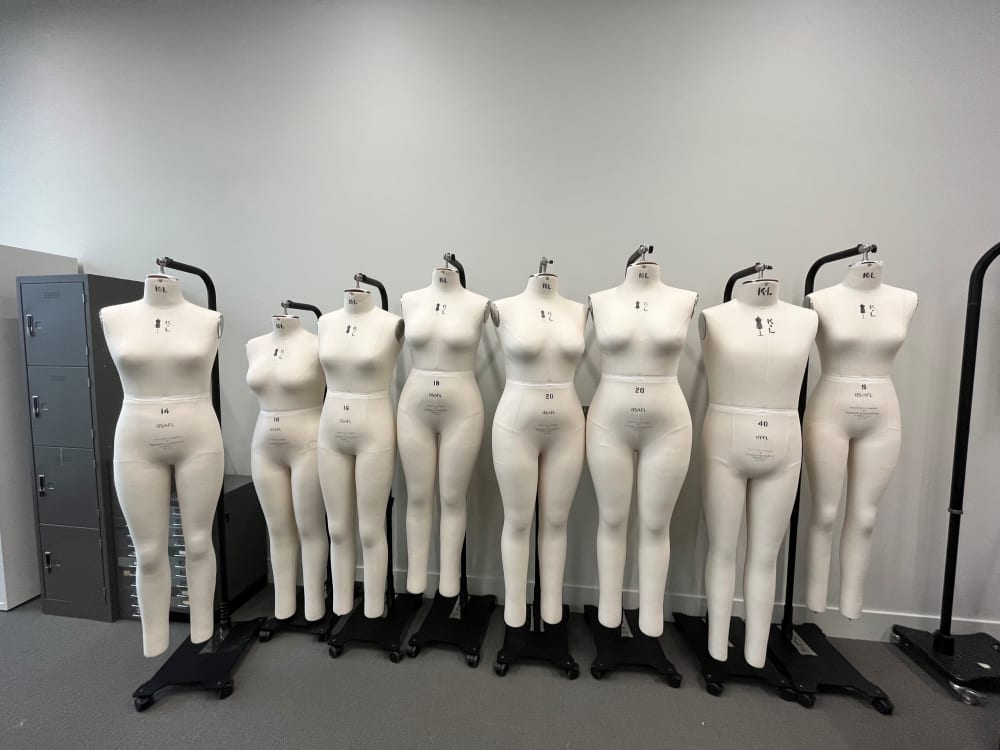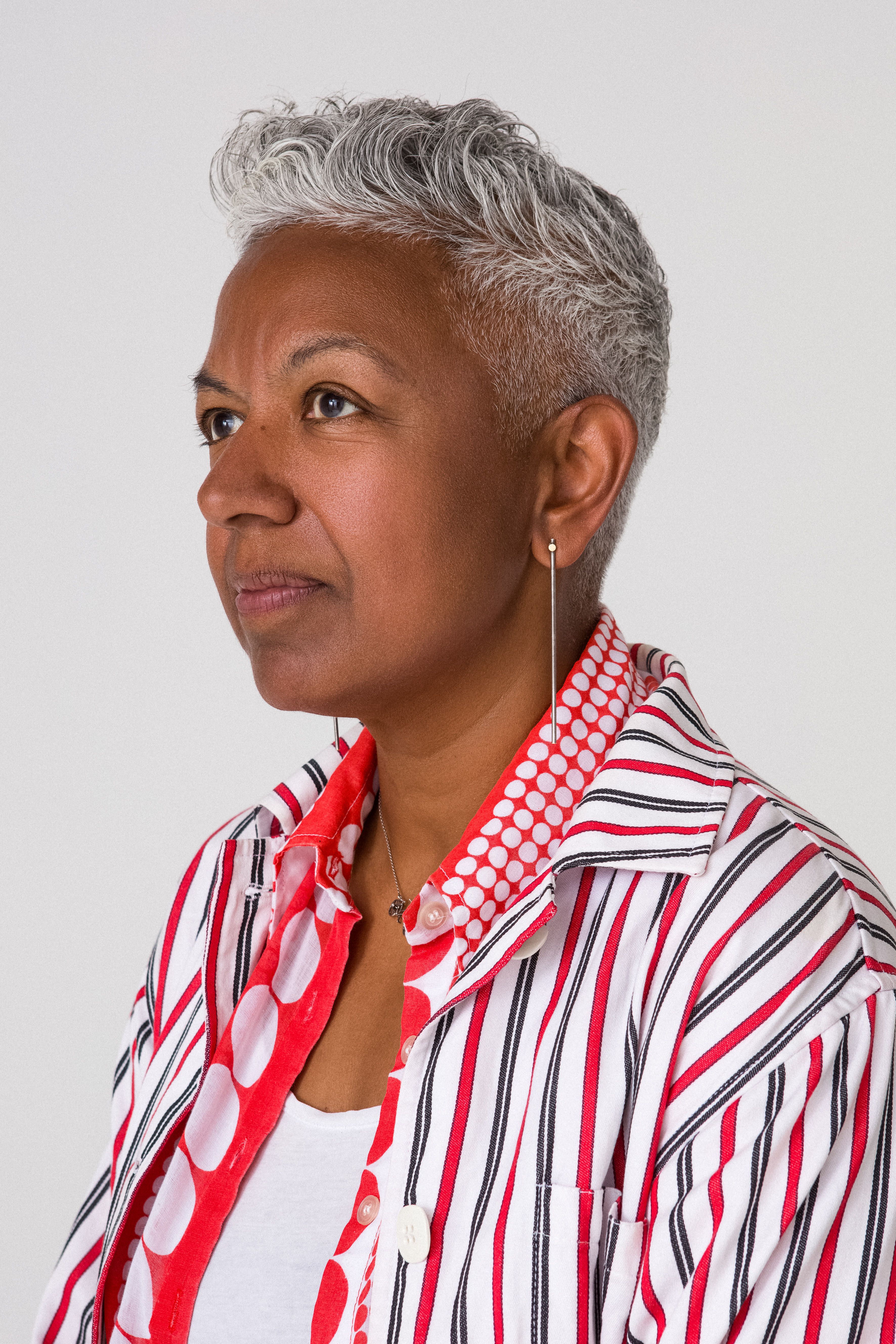
Claudine Rousseau returns to LCF as newly appointed Dean of School of Design and Technology

- Written byLondon College of Fashion
- Published date 16 January 2024

Claudine Rousseau has returned to LCF as newly appointed Dean of School of Design and Technology, just in time for the college's move to East Bank. After graduating from LCF in 1990, Claudine has since gone on to pursue a highly successful career with high fashion, sportswear and education working in tandem. We caught up with Claudine to find out more about her career history and what she hopes to bring to her new role.
So, you're an LCF alum turned LCF staff member, with a hugely successful career in industry sandwiched in between. Tell us about your career journey to date.
I graduated in from LCF in 1990 and immediately started my first job as a womenswear designer in the United Arab Emirates. It has been a non-linear journey of a career with high fashion, sportswear and education working in tandem. Looking back, I recognise the value and positive impact all experiences have had on each role I have undertaken. Working with clients in my first job contextualised the learning from my course to understand how to communicate a vision, to understand the emotional connection between an idea on a page, how one perceives oneself and would like to feel. This was truly eye-opening and pushed my creativity.
Additionally, designing and fitting for all different body shapes lay the foundation for the depth of exploration for fit, comfort, performance and movement that grew through the various projects for sportswear brands. The sportswear journey started in 2003, whilst working at an innovative design consultancy, Goose Design. Some brands I have worked with whilst at the consultancy and afterwards include Christopher Raeburn, PUMA, Hussein Chalayan, Adidas, Levi’s, and Soar Running to name a few.
At the same time, I started teaching pattern cutting and construction as an hourly paid lecturer at LCF. I was fortunate to work across various courses and eventually fused my professional work with my teaching practice by taking on the role as Course Leader for BA (Hons) Fashion Sportswear. I progressed to be Programme Director for Product, all the while keeping up my professional practice mainly working with cyclewear brand, Rapha Racing. The relationship with Rapha started when they won the contract with Sky to design the team kit in 2013. I was brought in to create products for optimum on bike fit. Five years later, whilst working on a collaborative project with Rapha and Norman Foster, I was asked to join the brand full time. This was a great opportunity to build a department and nurture a team to push creativity through make.
What inspired you to take your new role at LCF?
Heading up the atelier at Rapha for five years, my focus was on solving fit for performance challenges. This involved extensive exploration and testing of ideas using 2D and 3D pattern cutting software, work closely with all teams particularly materials and apparel design to push innovation and precision. Seeing how this work translated for the professional riders and for our commercial customers was invaluable to gain insights and analyse improvements for each seasonal development particularly with the development of new materials to meet the sustainability targets using recycled yarns and PFC free fabrics.
Given the urgency of the climate crisis and increased scrutiny on the fashion industry, I recognize the transformative role of education. LCF has consistently led in addressing crucial issues affecting fashion in diverse contexts, making it a proactive leader in driving positive change through innovative initiatives. So, when the role of Dean of School of Design and Technology was advertised, and I read the UAL strategy, I was excited and inspired to be part of that journey for shaping creativity for the future. It is a privilege to work with the brilliant minds that form the academic, technical and support teams at LCF to inspire the current industry, future industry and our students who will be driving forward the future of fashion.
Where does your specialism lie and what are you passionate about?
It is interesting to learn more about oneself through the lens of a professional career. Although I have specialised in precision pattern cutting for performance clothing, seeking and testing new approaches, it is people that I am really passionate about. Very little gets done in isolation and I see the true value in collaboration, having human compassion to give space for people to be their best selves, openness to explore and challenge ideas, be ambitious and steer the purpose.
Professionally, I am primarily interested in the body in motion, how clothing can enhance performance from both physiological and psychological perspectives. A noteworthy project was to create the fastest time trial suit in the world, aiming to enhance performance through advancements in thermoregulation and strain reduction. Drawing on the theories of drag reduction research, I honed in on fit optimization, recognizing it as the key opportunity for substantial gains. This undertaking was a collaborative effort, involving internal teams at Rapha and external partnerships with two universities.
Shifting gears creatively, I took on the role of designing costumes for an operatic performance of "Al-Atlal," an iconic piece by Egyptian singer Oum Kalthoum from the 1950s which took place at the Sheikh Jaber Al-Ahmad Cultural Centre in Kuwait. I had the unique opportunity to explore performance in a different creative realm and working closely with the set design team, production company, local centre team, singer Mai Farouk, and the orchestra, this project showcased the intersection of innovation and artistic collaboration.

Where do you see the future of fashion design heading in the next 5 years – are you noticing any particular advancements or innovations coming through?
We are in the space of exploring the opportunities and impact of AI, automation and the virtual world. Technology moves at a rapid pace and for designers it is pertinent to have an open mindset to understand the potential of how this can support positive change for the fashion industry and foster new ways of thinking. I think in the next five years fashion design will witness more of a dynamic interplay of AI and human creativity, a continued heightened focus on sustainability, social responsibility, and a conscious effort to preserve finite resources. There will be a continued integration of traditional craft skills and new technologies and real and virtual experiences. The role of designer will continue to evolve.
Have you had any interesting interactions with students since you have been in your new role?
I have had engaging interactions with students in various settings since taking on my new role. Taking the stairs in the new building has provided opportunities for informal conversations with students and staff and it inspiring to see students using the space, working physically on their products in early, raw forms.
Attending an MA Womenswear toile crit showcased the exciting progress of their final major projects. Additionally, I've connected with students from across the school through the student/dean forum and course committees, gaining valuable perspectives of the student experience. I plan to attend more sessions to further immerse myself in the learning environment and experience first-hand how students are exploring and testing ideas through hands-on working and engaging in critical thinking.
In your opinion, why is LCF's move to Stratford so significant? What opportunities will this enable for both staff and students?
Being all on one site, is significant in bringing together the full breadth of fashion in all its disciplines and strengthen connections between the schools and centres at LCF that provide this spectrum. In addition to exploring their subject specialism, students will have more opportunity to collaborate with others and understand how their focus is part of the interconnective fashion landscape. Just being in the same canteen and shared student open spaces gives opportunity for organic conversations to ignite.
As part of East Bank, there is potential for exciting projects to flourish with our immediate partners such as the V&A, UCL and Sadlers Wells and with the wider longstanding established community in Stratford. I am looking forward to seeing how we can connect meaningfully to inspire through creative collaborations.
- Find out more about School of Design and Technology at LCF.